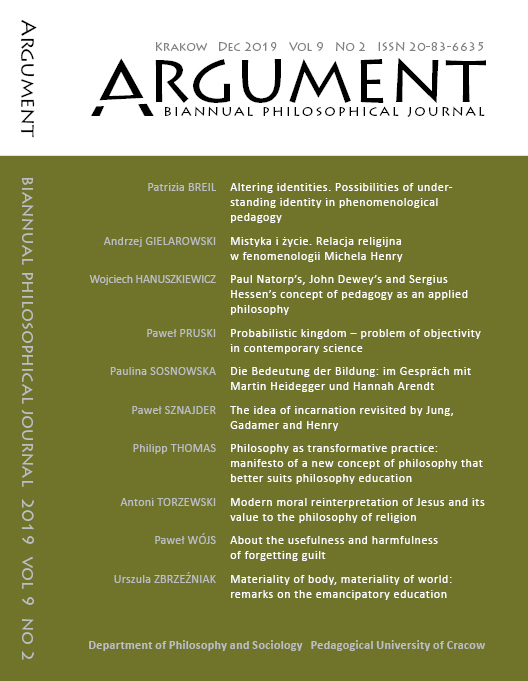Probabilistic kingdom: problem of objectivity in contemporary science
DOI:
https://doi.org/10.24917/20841043.9.2.9Słowa kluczowe:
philosophical interpretations of probability, the objectivity of probability, probabilism, determinism, scientific realismAbstrakt
In modern science, the theory of probability is one of the basic tools. Scientists using probability often refer to its objective interpretation. They emphasize that their probabilistic hypotheses concern objective facts, not degrees of belief. Accordingly, the following questions arise: What is the meaning of this type of probabilistic hypothesis? Is the assumption of objectivity necessary? The paper addresses these questions by analyzing objective probability in the context of the scientific debate on determinism. Two types of arguments will be presented. On the one hand, there is the assertion that objective probability can exist only in an indeterministic world. Then, on the other hand — I analyze the assertions of those who believe in the co-existence of objective probability and determinism. As a result I show that the acceptance of deterministic and indeterministic fields as possible areas where objective probability can occur is extremely problematic. Depending on the chosen area we encounter different types of problems. Therefore, I show that a significant number of these problems are associated with the acceptance of incorrect metaphysical assumptions. And finally, I postulate that the objectivity of probability (and assumptions pertaining to it) can be reduced (without any losses) to the epistemic variant.
Bibliografia
Blackburn, S. (1994). The Oxford dictionary of philosophy. Oxford: Oxford University Press.
##plugins.generic.googleScholarLinks.settings.viewInGS##
Carnap, R. (1950). Logical foundations of probability. Chicago: University of Chicago Press.
##plugins.generic.googleScholarLinks.settings.viewInGS##
Carnap, R. (1971). A basic system of inductive logic. Part I. Oakland: University of California Press.
##plugins.generic.googleScholarLinks.settings.viewInGS##
Childers, T. (2013). Philosophy and probability. Oxford: Oxford University Press.
##plugins.generic.googleScholarLinks.settings.viewInGS##
Eagle, A. (2010). Philosophy of probability: Contemporary readings. London: Routledge.
##plugins.generic.googleScholarLinks.settings.viewInGS##
de Finetti, B. (1974). Theory of probability. Hoboken: John Wiley & Sons.
##plugins.generic.googleScholarLinks.settings.viewInGS##
de Finetti, B. (2008). Philosophical lectures on probability. Berlin: Springer Verlag.
##plugins.generic.googleScholarLinks.settings.viewInGS##
Gillies, D.A. (2000). Philosophical theories of probability. London: Routledge.
##plugins.generic.googleScholarLinks.settings.viewInGS##
Hoefer, C. (2007). The third way on objective probability: A sceptic’s guide to objective chance. Mind, 116(463), 549–596.
##plugins.generic.googleScholarLinks.settings.viewInGS##
Keynes, J.M. (1921). A treatise on probability. London: Macmillan and co.
##plugins.generic.googleScholarLinks.settings.viewInGS##
Loewer, B (2001). Determinism and chance. Studies in History and Philosophy of Modern Physics, 32, 609–620.
##plugins.generic.googleScholarLinks.settings.viewInGS##
Popper, K. (1982). Quantum theory and the schism in physics. New Jersey: Rowman and Littlefield.
##plugins.generic.googleScholarLinks.settings.viewInGS##
Ramsey, F.P. (1926). Truth and probability (pp. 156–198). In: R.B. Braithwaite (Ed.). Foundations of mathematics and other essays. London: Kegan, Paul, Trench, Trubner, & Co..
##plugins.generic.googleScholarLinks.settings.viewInGS##
von Mises, R. (1957). Probability, statistics and truth. (2nd Eng. ed.). Dover: George Allen & Unwin.
##plugins.generic.googleScholarLinks.settings.viewInGS##
Nau, R.F. (2002). De Finetti was right: probability does not exist. Theory and Decision, 51, 89–124.
##plugins.generic.googleScholarLinks.settings.viewInGS##
Schaffer, J. (2007). Deterministic chance?. The British Journal for the Philosophy of Science, 58(2), 113–140.
##plugins.generic.googleScholarLinks.settings.viewInGS##


